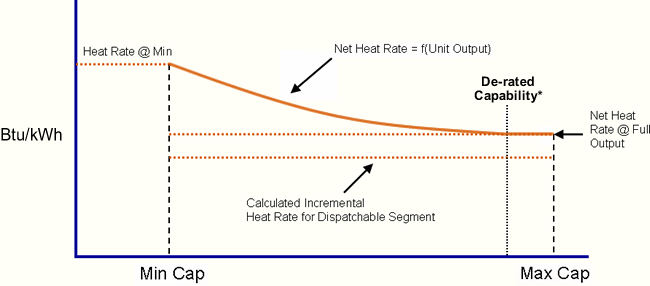Heat Rate Column
Column Type = Text
The Heat Rate column allows the user to specify energy efficiency for a thermal resource or to reference heat rate segments. The heat rate is entered in heat content per kWh (Btu/kWh), based on HHV (higher heating value). A heat rate of zero (0) may be specified for resources with zero fuel cost. A heat rate curve can be defined for non cycling and must run resources by defining a heat rate at minimum. See Heat Rate at Minimum for more information.

![]() NOTE: Specify inputs for any time period (annually, monthly, weekly, hourly, or sub-hourly). For information on specifying a variable's time series, see Entering a Time Series.
NOTE: Specify inputs for any time period (annually, monthly, weekly, hourly, or sub-hourly). For information on specifying a variable's time series, see Entering a Time Series.
Storage Resources (see below) are only compatible with annual and monthly references.
For Heat Rate Segments
An unlimited number of heat rate segments can be defined in the Heat Rate Definitions table. These heat rate sets are referenced using the prefix hrd_ followed by the Heat Rate Set ID. A reference to the Heat Rate Definitions table in this (i.e., Heat Rate) column will override any entries in the Heat Rate at Minimum, UBB Segment Size, UBB Heat Rate, and other UBB-related columns. If using segments, all heat rate and UBB information should then be entered in the Heat Rate Definitions table.
For Storage Resources
The heat rate column is used differently for Storage Resources. Instead of generation efficiency, it represents the generation/charging cycle efficiency (the relative efficiency of generating versus charging). For example, if the heat content is measured in Btu, then a heat rate of 3,412 is considered 100% efficient, so 3412 divided by the heat rate gives the generation/charging cycle efficiency for the unit. If the generation/charging efficiency of a unit is 80%, the value in the heat rate column would be 4265 (3412/4265 = .8 or 80%).
![]() Heat Rate Column
Heat Rate Column
